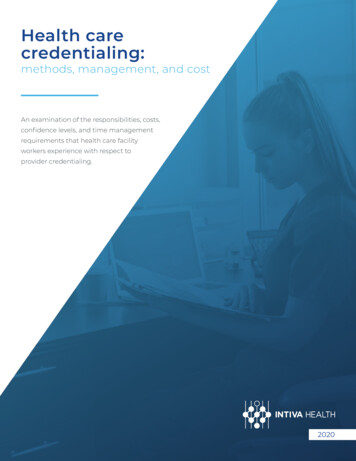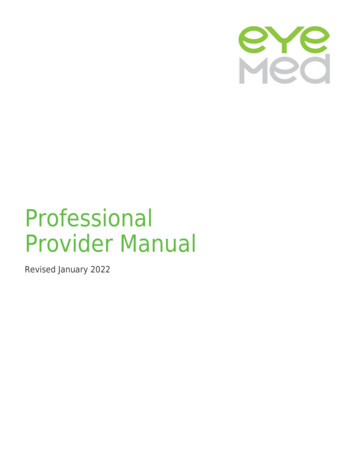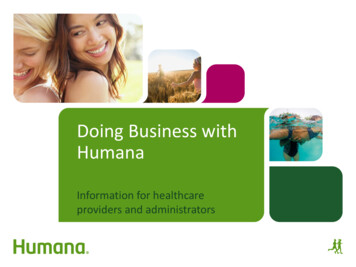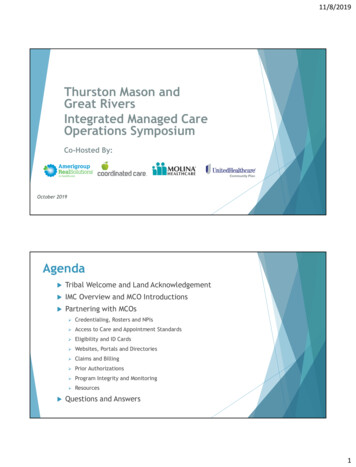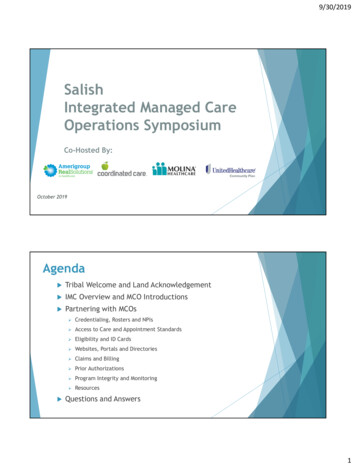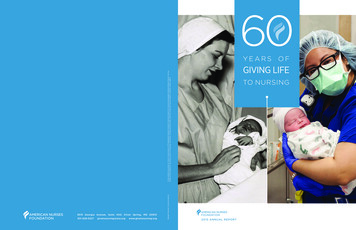
Transcription
THE AMERICAN HOLISTIC NURSESCREDENTIALING CORPORATIONCORE ESSENTIALS FOR THE PRACTICEOF HOLISTIC NURSING Not to be reprinted without permission of AHNCCRevised December 2017, March 2012
Core Essentials for the Practice of Basic Holistic NursingOVERVIEWA. Purpose of This DocumentThe document, Scope and Standards of Holistic Nursing Practice, 2013, co-published byANA and AHNA provides an explication of the specialty, Holistic Nursing. It provides adetailed discussion of the scope of the Holistic Nurses’ practice, including the CoreValues, Principals, Standards, and related practices. The Core Values provides aphilosophical context and guides how we think about the Standards and our practice. TheStandards set the norms or criteria for the practice; the practices explicate or spell out theactivities and behaviors required of the expert Holistic Nurse. Practice competenciesidentified through the AHNCC Role Delineation Study are presented here within thisdocument and are embedded within the AHNA Standards of Holistic Nursing Practice.Holistic Nurses practice at four levels: Basic Non-Baccalaureate Nursing, BasicBaccalaureate in Nursing, Advanced Holistic Nursing, and APRN Advanced HolisticNursing.The AHNCC examinations are designed to assess essential knowledge and skillsassociated with the 16 (sixteen) AHNA Scope and Standards of Holistic Nursing Practiceand related Competencies for each level of practice. Because Holistic Nurses carry outtheir activities and behaviors within the context of Holistic Nursing’s philosophy, theCompetencies are embedded in the Holistic Nursing Core Values. In this document BasicCore Competencies, and more in-depth articulation specific to some competencies, areprovided.B. Structure of the Attached Materials1. The Essentials for Holistic Nursing is presented in four (4) sections:a) Section 1, presents competencies expected of all Holistic Nurses, embedded inthe Core Values of Holistic Nursing. A Blueprint for the Basic CertificationExaminations follows this listing of Essential Knowledge and Skills for theBasic Practice of Holistic Nursing.b) Section 2, offers the examination blueprint for the HN and HNB basic holisticnursing examinations.c) Section 3 provides a list of selected integrative, healing practices that may beused by Holistic Nurses.1 AHNCCRevised by M. Erickson and K. Sandor, December 2017Prepared by H Erickson, March, 2012
Core Essentials for the Practice of Basic Holistic Nursingd) Section 4 provides Appendix A and presents the Standards and their relatedcompetencies for the Basic Holistic Nursing examinations.SECTION 1. ESSENTIALS FOR BASIC PRACTICE, REGISTEREDHOLISTIC NURSES1A. Core Value: Holistic Philosophy, Theories, and Ethics1. Holistic Nurses practice within Holistic Nursing’s philosophy, theories, and ethicalcode. Specifically, the Holistic Nurse:a) Uses ANA and AHNA documents (standards, code of ethics, to guide practice(#71)i. Overview of Principles of HN as defined by AHNA Scope andStandards for Practicea) Lists a discussion of principles and how they provide a linkbetween philosophy and Standardsb) Lists Standards Derivation of Standardsc) Relationship of Competencies to Standards Derivation of Competenciesii. Relation between AHNA and ANAb) Uses AHNA Core Values to articulate foundations of Holistic Nursing (#72)i. Unity of all things.a) Energy and interconnectedness of all things;b) Consciousness;This section is organized around the Core Values of Holistic Nursing. Some of the CoreValues have several components. For example, Core Value 2 Holistic Nursing Practiceaddresses a) competencies related to quality of care and caring (i.e. Standard 10);competencies related to the traditional activities involved in the caring process (i.e.Standards 1-6); competencies related to the holistic nurse as a collaborator in provision ofholistic care (Standard 13); and competencies related to the holistic nurse as a leader inprovision of holistic care. The first and last two groups of competencies are not usuallyincluded in discussions of the Caring Process. Nevertheless, they are included under thisCore Value because the Caring Process involves more than just the activities of carrying outthe process (i.e. Standards 1-6); it also involves how it is performed, evaluation of thequality of the care provided; collaboration with peers to ensure continuity, and consistencyand to serve as a learning experience for colleagues; as an opportunity to involve the entirehealthcare team to maximize care efficacy, and to provide leadership for change.12 AHNCCRevised by M. Erickson and K. Sandor, December 2017Prepared by H Erickson, March, 2012
Core Essentials for the Practice of Basic Holistic Nursingc) Nurse as an instrument of healing Use of presence, intentionality, unconditionalacceptanced) Human caring, i.e. the holistic nursing process, is defined byAHNA as “The moral ideal of nursing in which the nursebrings one’s whole self into a relationship with the wholeself of the person being cared for in order to protect thatperson’s vulnerability, preserve her or his humanity anddignity, and reinforce the meaning and experience ofoneness and unity” (AHNA, 2013, p.90).ii. Holistic Nursing as a caring-healing relationship/partnership withothers.a) The Professional Holistic Nurse as an individual, partner,collaborator, and leaderi. Nurse as an instrument of healingii. Nurse Self-care (as a way of attaining, maintaining own health,restoring energy, preparing to work as energy conduit)iii. Nurse Self-care as a precursor for creating caring-healingpartnershipsiv. Nurse Self-reflection as a primary source of self-knowledge.v. Client as individual, family, group, communitya) The Client as expert of own health wellnessvi.) Self-knowledge is the primary source of information needed in thecaring process) includes beliefs, cultural values, folk/healthpractices, life perspectives.vii. The Family, significant others, and other healthcare as secondaryand/or tertiary sources of information.viii. Subjective experiences provide information regarding meaning oflife experiencesix. Alternative Health practices as optional for Holistic Nursingpracticex. Healing environmentsxi. Theories of Unitya) Integral Theoryb) Rogersxii. Practice Theoriesa) See AHNA (2013) for extant theoriesxiii. Alternative health practices commonly used by Holistic Nursesc) Uses self as an instrument of healing (e.g. as a conduit of healing energy). (#46).d) Models ethics and philosophy consistent with holistic nursing’s beliefs. (#53)e) Disseminates evaluation results according to laws and regulations. (#64)f) Honors uniqueness and inherent worthiness of clients throughout all aspects ofthe holistic nursing process. (#65)3 AHNCCRevised by M. Erickson and K. Sandor, December 2017Prepared by H Erickson, March, 2012
Core Essentials for the Practice of Basic Holistic Nursingg) Honors the individual as the authority/expert of his/her life experiences. (#66)i. Views client as primary source of informationii Recognizes significant others as secondary sources of informationh) Honors and facilitates the natural development of and unfolding of the client’s humanprocesses, and inherent capacity for self-healing#67)I Health and wellness as the focus of HN practice, often called thehuman caring process.a) Health as a phenomena-of-quality of life and wellbeing;b) Wellness is defined as “Integrated, congruent functioningaimed toward reaching one’s highest potential” (AHNA,2012, p. 92). According to the National Wellness Institute,wellness is i.) Positive and affirming; ii.) A conscious, selfdirected and evolving process of achieving full potential;and, iii.) multi-dimensional and holistic, encompassinglifestyle, mental and spiritual well-being, and theenvironment.c) Sickness and disease as factors in one’s life that affectwellbeingi). Uses ANA Code of Ethics with Interpretive Statement and AHNA PositionStatement on Holistic Nursing Ethics and other regulations and laws to guidepractice. (#71)j). Uses AHNA Core Values to articulate the moral foundation of holistic nursing.(#72)k) Practices holistic nursing care in a manner that preserves and protects theclient’s confidentiality autonomy, dignity, rights, values, and beliefs withinlegal and regulatory parameters. (#73)l). Respects the client’s choices and health trajectory, even when it is incongruentwith conventional wisdom/standards. (#74)m) Assists persons in self- advocacy skill development, which includes makinginformed choices about their care. (#76)n) Demonstrates knowledge of the role and referral process of the ethicscommittee in the organization. (#79)o) Advocates for the holistic wellbeing of the global community withconsideration for the economy, education, and social justice. (#80)p) Acts on behalf of vulnerable and/or marginalized individuals or groups whocannot seek or demand ethical treatment on their own. (#81)q) Seeks available resources in formulating holistic, ethical decisions. (#82)r) Reports illegal, incompetent, or impaired practices (#83)s) Approaches clients as integrated, adaptive systems, interconnected with allother systems. (#93)t) Acknowledges that holistic health is a multidimensional state of well-being asperceived by the client. (#94)4 AHNCCRevised by M. Erickson and K. Sandor, December 2017Prepared by H Erickson, March, 2012
Core Essentials for the Practice of Basic Holistic Nursingu) Focuses on facilitating the individual’s growth, holistic health, and wellbeing.(#97).v) Uses Presence, Intentionality, Compassion, and Authenticity throughout theholistic nursing process. (#98)w) Uses holistic nursing theories to help integrate one’s knowing, doing, andbeing in practice. (#99)x) Creates innovative, quality-improvement activities to initiate changes inholistic healthcare. (#102)y) Promotes competency in Holistic Nursing Practice to assure quality of carefor individuals, families, and communities. (108)z) Promotes advancement of holistic nursing as a profession locally to globally.(#120)aa) Participates in systematic peer review considering practice standards andguidelines, relevant statutes, rules and regulations. (#136)bb) Identifies and reports discriminatory professional practices. (#143)cc) Engages in nondiscriminatory professional practices. (#144)dd) Assigns or delegates tasks as defined by the state nurse practice acts andaccording to the knowledge and skills of the designated care-giver. (#145).B. Core Value 2: Holistic Caring Process1. The Holistic Nurses contributes to quality nursing practice. Specifically, theHolistic Nursea) Approaches clients as integrated, adaptive systems, interconnected with allsystems. (#93)b) Acknowledges that holistic health is a multidimensional state of well-beingas perceived by the client. (#94)i. Defines health as “An individually defined state or process in which theindividual (nurse, client, family, group, or community) experiences asense of well-being, harmony, and unity such that subjective experiencesabout health, health beliefs, and values are honored; a process ofbecoming, expanding consciousness.” (AHNA, 2012, p 88)ii. Defines wellness as “Integrated, congruent functioning aimed towardreaching one’s highest potential” (AHNA, 2012, p. 92). Wellness is i.)Positive and affirming; ii.) A conscious, self-directed and evolving processof achieving full potential; and, iii.) multi-dimensional and holistic,encompassing lifestyle, mental and spiritual well-being, and theenvironment. (National Wellness Institute,http://www.nationalwellness.org; August, 2012).iii. Defines wellbeing as a subjective experience of wellness.5 AHNCCRevised by M. Erickson and K. Sandor, December 2017Prepared by H Erickson, March, 2012
Core Essentials for the Practice of Basic Holistic Nursingc) Acknowledges health and wellbeing as desired outcomes of holistic nursing.(#95)i. Advocates for plans that include strategies and outcomes based onhealth and wellbeing as defined by holistic nurses.d) Acknowledges self as integral with the healing environment. (#96)e) Focuses on facilitating client’s growth, health, wellbeing. (#97)f) Uses presence, intentionality, compassion, and authenticity throughout thecaring process. (#98)g) Uses holistic nursing theories to integrate ones knowing, doing, and being inpractice. (#99)h) Provides age and developmentally appropriate holistic care from infant to elderin a culturally and ethnically sensitive manner. (#104)i. Has basic understanding of extant holistic nursing theories and howto use themi) Documents relationship among diagnoses, expected outcomes, andevidence-based, holistic care plan in a secure and retrievable manner.(#28)j) Documents implementation of holistic care plan. (#51)k) Documents results of the evaluation. (#62)l) Creates innovative, quality-improvement activities to initiate changes inholistic healthcare. (#102)m) Provides age and developmentally appropriate holistic care from infant toelder in a culturally and ethnically sensitive manner. (#104)n) Implements processes to remove/decrease barriers to care. (#105)o) Promotes practice competency to assure quality care for individuals, families,and communities. (#108)p) Obtains and maintains certification in Holistic Nursing and other areas ofexpertise. (#107)q) Promotes advancement of holistic nursing as a profession locally toglobally. (#120)r) Has the ability to define a clear vision of holistic nursing practice,associated goals with implementation and evaluation plans to measuresuccess. (#121)s) Demonstrates energy, passion for quality holistic nursing practice. (#122)t) Creates environments that supports holistic nursing in risk-taking behaviors.(#123)2) The Holistic Nurse uses self as instrument of healing. Specifically, the HolisticNurse:a) Centers self before interacting with client. (#1)i) Understands and states the purpose of centering6 AHNCCRevised by M. Erickson and K. Sandor, December 2017Prepared by H Erickson, March, 2012
Core Essentials for the Practice of Basic Holistic Nursingii) Acquires knowledge and skills related to self-centeringiii) Recognizes that centering may need to be repeatedb) Elicits the client’s story (to reveal the context and complexity of the humanhealth experience). (#3)i) Self -knowledge (client’s story).ii) Family (and/or significant others) perspective as secondary sourceof information)iii) Nurses ways of knowing as pertinent information needed toprovide holistic care plan.iv) Other sources of information including medical perspectivec) Uses Presence, Intentionality, Compassion, and Authenticity throughoutthe holistic nursing process (#98).3) The Holistic Nurse collects comprehensive data relevant to the holistic paradigm.Specifically, the Holistic Nurse:a) Prioritizes data collection activities based on client’s immediate needs,condition, and/or situation. (#4)b) Collects data within the context of the holistic paradigm in a systematic andongoing process. (#5)c) Uses holistic nursing concepts and theories to guide data collection. (#6)d) Recognizes multiple ways-of-knowing as pertinent to the holistic caringprocess. (#8-14)e) Assesses (client-factors related to client’s needs, conditions, situation):i) Perceptions and meaning of the signs and symptoms, health, illness,sickness, wellbeing. (#15)ii) Understanding of the diagnostic procedures, diagnosis, a treatment planincluding integrative health practices. (#16)iii)Use of and preferences for conventional and integrative healthstrategies. (#17)iv. Learning needs and readiness to learn. (#18)v. Values, beliefs, and cultural practices. (#19)vi.) Lifestyle patterns and risk behaviors. (#20)vii) Physical, mind, body, spiritual dimensions, and their interactions(#21)viii) Comfort status and related sources. (#22)ix. Coping status and related resources. (#23)x. Cultural and environmental factors effecting client’s wellbeing. (#24)xi) Assess significant others’ perception of the client’s situation. (#25)xii. Assess interactions between client, significant others. (#26)xiii) Strengths, challenges, and available resources (internal and external).(#27)7 AHNCCRevised by M. Erickson and K. Sandor, December 2017Prepared by H Erickson, March, 2012
Core Essentials for the Practice of Basic Holistic Nursing4. The Holistic Nurse analyzes data to determine the diagnosis/issues as they relateto client needs, concerns, condition or situation. Specifically, the Holistic Nurse:a) Uses holistic nursing theories to interpret meaning, and identify relationshipsamong the data collected. (#29)b) Synthesizes data/information to identify patterns. (#30)c) Analyzes pattern(s) of data to derive diagnoses. (#31)d) Validates diagnosis in partnership with client. (#32)5. The Holistic Nurse formulates realistic outcomes that emphasize holistic healthand wellbeing. Specifically, the Holistic Nurse:a) Partners with clients to formulate realistic outcomes that emphasize health andwellness as defined by the client. (#33)b) Considers own expertise when defining outcomes. (#34)c) Facilitates client’s understanding that outcomes may evolve over time. (#35)d) Uses holistic nursing theory to help formulate the outcomes. (#36)6. The Holistic Nurse develops a plan with strategies and alternatives needed toattain outcomes. Specifically, the Holistic Nurse:a) Clarifies and validates client’s understanding of the plan. (#37)b) Facilitates client and significant others to explore holistic strategies and relatedresources needed to address each of the diagnoses and the expected outcomes.(#38)c) Integrates spiritually-based interventions in care plan as appropriate. (#39)d) Partners with client and significant others (as appropriate) to set timeline forthe care plan. (#40)e) Plans care that links assessment, diagnosis, and potential side effects. (#41)f) Uses standardized language and/or recognized terminology to document theholistic plan. (#42)g) Ensures inclusion of client’s values and beliefs in decision-making, holistic careplan, and negotiation of role-responsibilities. (#43)h) Co-creates a safe and effective care plan that incorporates appropriate integrativehealth practices. (#44)7. The Holistic Nurse implements the caring-healing plan. Specifically, the HolisticNurse:a) Integrates current trends, research, and evidence-based interventions specific tothe client’s needs, problem, or situation. (#45)b) Partners with client in the entire process and ensuresi. adherence to holistic nursing philosophy, core values, principles.8 AHNCCRevised by M. Erickson and K. Sandor, December 2017Prepared by H Erickson, March, 2012
Core Essentials for the Practice of Basic Holistic Nursingii. safe holistic and integrative practice effectiveness. (#48)c) Uses self as an instrument of healing or conduit of healing energy. (#46)d) Facilitates comfort using touch intentionally when appropriate. (#47)e) Coordinates delivery of inter-professional activities and:i. advocates for client’s self-knowledge as essential information. (#49)ii. Coordinates implementation of holistic care plan across settings andcaregivers. (#50)iii. Documents implementation of holistic care plan. (#51)iv. Facilitates client’s in establishing/maintaining relationships withhealthcare providers that are conducive to healing and attaining healthgoals. (#52)f) Promotes health-focused strategies:i. Models ethics and philosophy consistent with Holistic Nursing beliefs.(#53)ii. Facilitating clients and significant others to learn that healing is aholistic process. (#54)iii. Creates safe learning environment. (#55)iv. Uses teaching-learning methods appropriate to client’s needs/situation.(#56)v. Seeks ongoing feedback on information provided to client andsignificant others as indicated. (#57)vi. Facilitates others to access self-knowing and inner wisdom. (#58)vii) Facilitates others to learn about conventional and integrative practices.(#59)g) Partners with multiple sources (e.g. clients, advocates, etc.) to create healthdocuments. (#60)8. The Holistic Nurse evaluates progress toward attainment of outcomes.Specifically, the Holistic Nurse:a) Partners with clients and others, as indicated, to evaluate the effectiveness ofthe plan, and determine factors that contribute to differences between expectedand actual holistic outcome. (#61)b) Documents results of the evaluation. (#62)c) Uses ongoing evaluation to mutually revise, with persons involved: the plan,diagnosis, expected outcomes, and implementation. (#63)d) Disseminates evaluation results according to laws and regulations. (#64)9. The Holistic Nurse collaborates with others. Specially, the Holistic Nurse:a) Acknowledges expertise/competency of diverse disciplines. (#126)b) Maintains compassionate/caring relationship with peers/colleagues. (#127)c) Collaborates with inter-professional team to optimize resources needed forholistic care plan. (#128)9 AHNCCRevised by M. Erickson and K. Sandor, December 2017Prepared by H Erickson, March, 2012
Core Essentials for the Practice of Basic Holistic Nursingd) Participates in professional organizations in a membership capacity at local,state, national and international levels to expand promotion of holistic health.(#129)i. Disseminates information to colleagues, peers, interdisciplinarymembers, and the community regarding cost holistic health caremethods, strategies, and cost-effectiveness.ii. Trends in health care Aging population Healthcare reform HN3590 Nurse Coachinge) Shares knowledge at patient-care conferences, team meetings, etc. (#130, 131)f) Provides peers with feedback regarding their practice and/or role performance,as it affects the wellbeing of both the peer and their clients, using constructivelanguage and sincere communications. (#132)10. The Holistic Nurse provides leadership for healthcare providers. Specifically,the Holistic Nurse:a) Engages in consultation with multi-disciplinary healthcare teams. (#115)b) Works to create healthy environments that support holistic healthcare. (#116)c) Demonstrates creativity and flexibility during periods of system change (#117)d) Utilizes trending patterns of care/outcomes as these contribute to improvingpractice. (#118)e) Serves in key roles in the work setting by participating on committees, councils,and administrative activities. (#119)f) Promotes advancement of holistic nursing as a profession locally to globally.(#120)g) Has the ability to define a clear vision of holistic nursing practice, associatedgoals with implementation and evaluation plans to measure success. (#121)h) Demonstrates energy, excitement, and a passion for quality holistic nursingpractice. (#122)i) Creates an environment that supports holistic nursing in risk-taking behaviors.(#123)j) Proactively promotes innovative ideas aimed at creating a caring environmentconducive to client holistic health and well-being. (#124)k) Supports appropriate balance between work and holistic self-care in the lives ofnurses and other colleagues. (#125)h) Utilizing and allocating resources in a safe, effective, financially responsiblemanner:i) Evaluates factors such as client resources and circumstances, the safety,cost-benefits, efficiencies, and impact on practice when choosinginterventions. (#141)ii. Assigns or delegates tasks as defined by the state nurse practice acts andaccording to the knowledge and skills of the designated care-giver. (#145)10 AHNCCRevised by M. Erickson and K. Sandor, December 2017Prepared by H Erickson, March, 2012
Core Essentials for the Practice of Basic Holistic Nursingiii) Disseminates information to healthcare providers and the communityC. Core Value 3: Holistic Communication, Therapeutic Healing Environment, andCultural Diversity1. The Holistic nurse communicates effectively in all areas of practice. Specifically, theHolistic Nurse:a) Seeks feedback from clients regarding impact and effectiveness of holistic nursingcare. (#106)b) Uses communication knowledge and skills (e.g. active listening and use oftechnology) to interact effectively within the client’s and colleague’s worldview.(#109)c) Validates communication with clients and colleagues to ensure constructive,purposeful interactions. (#110)d) Facilitates negotiations of conventional and integrative therapies or practices forcontinuity of care and program planning. (#111)e) Facilitates inter-professional processes that enhance contributions of all membersof the health team. (#112)f) . Provides information related to the use, efficacy, safety, and indications of holisticand integrative health practices within the client’s context. (#113)g) Partners with client and colleagues to enhance healthcare-consumer’s perceptionof wellbeing. (#114)2. The Holistic Nurse practices in an environmentally safe and healthy manner.Specifically, the Holistic Nurse:a) Acknowledges that the wellbeing of the ecosystem is a determining conditionfor the wellbeing of human beings. (#146)b) Engages in activities that nurture and enhance our integral relationship withearth. (#147)c) Models earth stewardship through lifestyle choices. (148)d) Proactively working to protect the wellbeing of the ecosystem. (#149)e) Contributes to an environment conducive to the holistic, integral education ofhealth care providers. (#151)f) Promotes environments that support understanding, respect, health, healing,caring, wellbeing, wholeness, and harmony. (#147)3. Cultural Diversitya) Reflects on the effect of one’s cultural and spiritual beliefs, life experiences, biases,education, and values on his/her professional practice. (#70)b) Provides age appropriate holistic care in a culturally and ethnically sensitivemanner. (#77)11 AHNCCRevised by M. Erickson and K. Sandor, December 2017Prepared by H Erickson, March, 2012
Core Essentials for the Practice of Basic Holistic Nursingc) Provides age and developmentally appropriate holistic care from infant to elderin a culturally and ethnically sensitive manner. (#104)d) Uses communication knowledge and skills (e.g. active listening and use oftechnology) to interact effectively within the client’s and colleague’s worldview.(#109)e) Understands the diversity of the local and community and associated resources.(#139)f) Incorporates cultural practices that affect the client’s holistic healthcare planand related outcomes. (#140)D. Core Value 4: Holistic Education and Research1. The Holistic Nurse attains knowledge and competence that reflects current HolisticNursing. Specifically, the Holistic Nurse:)a) Seeking and acquires knowledge and skills pertinent to the practice of HolisticNursing. (#84)b) Seeks experience, formal and informal, to maintain and develop clinical skills,professional knowledge, and personal growth related to holistic nursing . (#85)c) Uses current knowledge, including research findings to expand clinical practice,professional performance, and role development. (#86)d) Maintains professional records that provide evidence of competency, and lifelong learning related to holistic nursing. (#87)2. The Holistic Nurse integrates various sources of evidence including researchfindings into practice. Specifically, the Holistic Nurse:a) Demonstrates knowledge of the role and referral process of the ethics committeein the organization. (#79)b) Uses the best available evidence, including theories and research findings, toguide holistic nursing practice decisions throughout the nursing process. (#88)c) Recognizes that evidence-based practice contains three components: the bestevidence, the client’s preferences, and the nurse’s expertise. (#89)d) Participates, actively and ethically, in holistic research activities when able. (#90)e) Participates in the work of the research ethics committee. (#91)f) Supports research of others on healing, wholeness, spirituality, and/or otherholistic concepts. (#92)E. Holistic Nurse Self-Reflection and Self-Care12 AHNCCRevised by M. Erickson and K. Sandor, December 2017Prepared by H Erickson, March, 2012
Core Essentials for the Practice of Basic Holistic NursingThe Holistic Nurse evaluates own practice using current standards, statues, rules,and regulations. Specifically, the Holistic Nurse:a) Engages in on-going self-reflection to identify wisdom learned and areas for selfdevelopment. (#68)b) Values all life experiences as opportunities to find personal meaning andcultivates self-awareness, self-reflection, and growth. (#69)c) Demonstrates a commitment to practice holistic self-care strategies to managestress and enhance wellbeing. (#78)d) Engages in the practice of self-care as a prerequisite to providing holistic care.(#103)e) Supports appropriate balance between work and holistic self-care in the lives ofnurses and other colleagues. (#125)f) Engages in self-evaluation of own professional holistic nursing practice,considering current practice standards, laws, regulations, and rules. (#133)g) Engages in self-evaluation to identify areas of strength, opportunities forprofessional development with consideration to current laws, regulations, andrules. (#134)h) Seeks feedback (formal and informal) from clients, and colleagues/peers inrespect to professional practice. (#135)i) Participates in systematic peer review considering practice standards andguidelines, relevant statutes, rules and regulations. (#136)j) Performs action(s) necessary to achieve holistic goals identified from evaluationprocesses. (#137)13 AHNCCRevised by M. Erickson and K. Sandor, December 2017Prepared by H Erickson, March, 2012
Core Essentials for the Practice of Basic Holistic NursingSECTION 2. EXAMINATION BLUEPRINTS FOR BASIC PRACTICE,HN and HNB EXAMINATIONSTable 1. Blueprint, Basic Holistic Nursing (HN) Examination. Standards and Competencies Mapped byCore Values (Examination contains 170 items)Basic HolisticNursingStandards:Competencies(Basic HN)Questions onExaminationCore Value 1Core Value 2Core Value 3Core Value 4Core Value 5HolisticPhilosophy,Theories, andEthicsHolisticCaring ProcessCommunications,TherapeuticEnvir
Values have several components. For example, Core Value 2 Holistic Nursing Practice addresses a) competencies related to quality of care and caring (i.e. Standard 10); competencies related to the traditional activities involved in the caring process (i.e. Standards 1-6); competencies related to the holistic nurse as a collaborator in provision of


